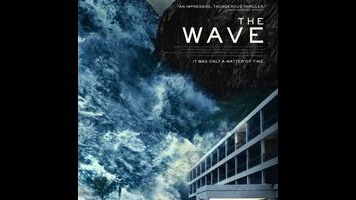The Wave proves Hollywood has no monopoly on thrilling disaster flicks

Hollywood dominates the spectacle business so thoroughly that it’s always a pleasure to see another country make a proficient stab at it. The Wave is a Norwegian disaster movie, of all things, and it follows the genre’s simple playbook: Set up a handful of thinly drawn characters (given some weight by skilled actors), provide one act’s worth of exposition about the danger facing their location, unleash hell. Subtitles are involved, and the effects budget is comparatively meager; in every other respect, though, The Wave is a Scandinavian cousin to films like The Impossible and San Andreas, with an emphasis on mass destruction and the struggle for survival. It’s almost exactly the same film as The Impossible, actually, except without the queasiness of watching the camera focus on the only white people in the vicinity (since everyone here is white). Familiarity can be fatal in art cinema, but in this context the stock situations and types function more like comfort food, with the absence of Americans providing a little welcome spice.
So, here’s the act-one setup: Kristian (Kristoffer Joner, also currently appearing in The Revenant) is a geologist who—wouldn’t you know it?—has just completed his last day working in Geiranger, a small, almost painfully gorgeous tourist locale in western Norway. The family is moving, and has already packed; Kristian’s wife, Idun (Ane Dahl Torp), who works the graveyard shift as a hotel manager, has booked a room for the night, though only skateboarding teenager Sondre (Jonas Hoff Oftebro) winds up using it. Kristian and his other child, adorable moppet Julia (Edith Haagenrud-Sande), camp out in the empty house, so Julia can say goodbye. But Kristian is nervous, because his former job involved monitoring the area for potential rockslides that could cause a tsunami, and there were some troubling signs on his final run in the field. Sure enough, the mountain overlooking Geiranger, called Åkerneset, suddenly crumbles, and a warning siren informs Mom and Dad—separated, each with one kid—that they have about 10 minutes to get to high ground before a gigantic wall of water obliterates the entire village.
All of this is based on a very real threat: Geiranger exists, and a rockslide that will cause a tsunami is considered to be inevitable. (There have been several such incidents in Norway over the past century, killing hundreds.) The Wave may slightly disappoint viewers who just want to see what that tsunami would look like—the film’s effects are impressive, given that it didn’t cost $100 million-plus, but the wave itself does look distinctly digital, to the point where one almost expects it to turn into a team of horses à la The Lord Of The Rings. However, director Roar Uthaug, who presumably landed the job on the basis of his awesome name, expertly orchestrates the panic that ensues when the alarm goes off, as the entire village wakes up en masse in the middle of the night and scrambles to reach a particular elevation. And the heart of the movie, as in The Impossible, lies in the aftermath, as Kristian desperately searches for Idun and Sondre, who are both trapped in the hotel’s bomb shelter with a dangerously crazed guest (Danish actor Thomas Bo Larsen, from The Celebration) as flood waters slowly rise.
Admittedly, there’s some dumb stuff here—the whole “on their very last day in town” element is cheesy as hell (though it provides a convenient means of separating the family), and the dramatic climax employs an especially shameless trope that has arguably only ever worked in The Abyss. At other times, though, The Wave favorably calls to mind another James Cameron movie, Titanic. Part of that has to do with the unavoidable similarity of scenes depicting people in an enclosed space as they try to avoid drowning, but there’s also a corresponding earnestness that’s very appealing, shifted from romantic love to familial love. At the same time, the movie isn’t afraid to go to some dark places. One scene is so damn grim that it might even justify the aforementioned climactic hokiness, if only because otherwise poor Sondre would qualify as one of the most traumatized children in motion picture history. That ending does make The Wave feel extremely Hollywood. But, then, so does the rest of the movie, and that’s not such a bad thing.
For thoughts on, and a place to discuss, plot details we can’t reveal in this review, visit The Wave’s spoiler space.